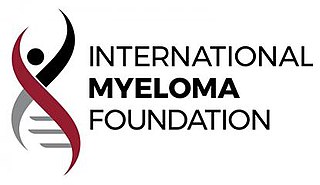
Arthritis is a term often used to mean any disorder that affects joints. Symptoms generally include joint pain and stiffness. Other symptoms may include redness, warmth, swelling, and decreased range of motion of the affected joints. In some types of arthritis, other organs are also affected. Onset can be gradual or sudden.

Psoriasis is a long-lasting, noncontagious autoimmune disease characterized by patches of abnormal skin. These areas are red, pink, or purple, dry, itchy, and scaly. Psoriasis varies in severity from small localized patches to complete body coverage. Injury to the skin can trigger psoriatic skin changes at that spot, which is known as the Koebner phenomenon.
The National Institute of Arthritis and Musculoskeletal and Skin Diseases (NIAMS) is one of the institutes and centers that make up the National Institutes of Health, an agency of the United States Department of Health and Human Services (HHS).
Spondyloarthritis (SpA), also known as spondyloarthropathy, is a collection of clinical syndromes that are connected by genetic predisposition and clinical manifestations. The best-known clinical subtypes are enteropathic arthritis (EA), psoriatic arthritis (PsA), ankylosing spondylitis (AS), and reactive arthritis (ReA). Spondyloarthritis typically presents with inflammatory back pain and asymmetrical arthritis, primarily affecting the lower limbs, and enthesitis, inflammation at bone-adhering ligaments, tendons, or joint capsules.

Psoriatic arthritis (PsA) is a long-term inflammatory arthritis that occurs in people affected by the autoimmune disease psoriasis. The classic feature of psoriatic arthritis is swelling of entire fingers and toes with a sausage-like appearance. This often happens in association with changes to the nails such as small depressions in the nail (pitting), thickening of the nails, and detachment of the nail from the nailbed. Skin changes consistent with psoriasis frequently occur before the onset of psoriatic arthritis but psoriatic arthritis can precede the rash in 15% of affected individuals. It is classified as a type of seronegative spondyloarthropathy.
The National Multiple Sclerosis Society (NMSS) is an American nonprofit organization founded in 1946. It is an organization dedicated to supporting individuals affected by multiple sclerosis (MS) and funding research to find a cure for the disease. They provide resources, support services, advocacy efforts, and educational programs to improve the lives of people with MS and their families.
The Asthma and Allergy Foundation of America (AAFA) is the leading patient organization for people with asthma and allergies and the oldest asthma and allergy patient group in the world. AAFA is dedicated to saving lives and reducing the burden of disease for people with asthma, allergies, and related conditions through research, education, advocacy, and support.
Ustekinumab, sold under the brand name Stelara among others, is a monoclonal antibody medication developed by Janssen Pharmaceuticals, for the treatment of Crohn's disease, ulcerative colitis, plaque psoriasis and psoriatic arthritis, targeting both IL-12 and IL-23.

The Arthritis Foundation is a nonprofit organization addressing the needs of people living with arthritis in the United States.
The Lupus Foundation of America (LFA), founded in 1977, is a national voluntary health organization based in Washington, D.C., with a network of chapters, offices and support groups located in communities throughout the United States. The Foundation is devoted to solving the mystery of lupus. Its mission is to improve the quality of life for all people affected by lupus through programs of research, education, support and advocacy.

The International Myeloma Foundation (IMF) is an American non-profit organization serving patients with myeloma, a cancer of plasma cells in the bone marrow. The IMF also provides support and information for family members, caregivers of myeloma patients, physicians and nurses. The organization is dedicated to improving the quality of life for all myeloma patients by focusing on four key areas: research, education, support, and advocacy.

Secukinumab, sold under the brand name Cosentyx among others, is a human IgG1κ monoclonal antibody used for the treatment of psoriasis, ankylosing spondylitis, and psoriatic arthritis. It binds to the protein interleukin (IL)-17A and is marketed by Novartis.
Ronald Jonathan Falk, MD, FACP, FASN is the Nan and Hugh Cullman Eminent Professor and Chair of the Department of Medicine at the University of North Carolina-Chapel Hill (UNC). He is a clinical nephrologist and internationally recognized expert in anti-neutrophil cytoplasmic autoantibody (ANCA)-induced vasculitis and autoimmune kidney disease. His career as a translational physician-scientist spans more than three decades. His clinical practice and translational research focus on characterizing the cell, tissue and physiologic changes in the development of specific autoimmune kidney diseases and developing new approaches for studying autoimmunity, inflammation and basic neutrophil/monocyte biology. He was Chief of the UNC Division of Nephrology and Hypertension from 1993-2015. He co-founded the UNC Kidney Center in 2005 and continues as Co-Director. Falk is a Past-President of the American Society of Nephrology (ASN). Since 2015, he has served as Chair of the Department of Medicine at UNC.

Apremilast, sold under the brand name Otezla among others, is a medication for the treatment of certain types of psoriasis and psoriatic arthritis. The drug acts as a selective inhibitor of the enzyme phosphodiesterase 4 (PDE4) and inhibits spontaneous production of TNF-alpha from human rheumatoid synovial cells. It is taken by mouth.
Louis Dubertret was born on 18 June 1943 in Douai, France. He had a distinctive career as an associate professor specializing in dermatology and cutaneous biology, is now a Professor Emeritus, and currently serves as the president of the René Touraine Foundation.
Guselkumab, sold under the brand name Tremfya, is a monoclonal antibody against interleukin-23 used for the treatment of plaque psoriasis.
Arthritis Australia is a charitable not-for-profit organisation advocating for people with arthritis and musculoskeletal conditions.
Risankizumab, sold under the brand name Skyrizi, is a humanized monoclonal antibody used for the treatment of plaque psoriasis, psoriatic arthritis, and Crohn's disease. It is designed to target interleukin 23A (IL-23A). It is given by subcutaneous injection.
The Parkinson's Foundation is a national organization that funds research and provides educational resources to Parkinson's disease patients and caregivers. The Parkinson's Foundation was established in 2016 through the merger of the National Parkinson Foundation and the Parkinson's Disease Foundation. The Parkinson's Foundation has headquarters in Miami and New York City, in addition to 17 chapters throughout the United States.
Joel M. Gelfand is an American dermatologist and epidemiologist at the University of Pennsylvania in Philadelphia, Pennsylvania. He currently serves as the James J. Leyden Professor in Clinical Investigation, the Vice Chair of Clinical Research, the director of the Psoriasis and Phototherapy Treatment Center, and the medical director of the Clinical Studies Unit in the Department of Dermatology at the Perelman School of Medicine at the University of Pennsylvania. He studies systemic comorbidities of psoriasis and much of his research has centered on the connection between cardiovascular disease and psoriasis.







